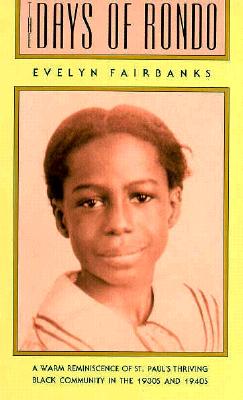The Days of Rondo

The Days of Rondo
In the 1930s and the 1940s Rondo Avenue was at the heart of St. Paul's largest black neighborhood. African Americans whose families had lived in Minnesota for decades and others who were just arriving from the South made up a vibrant, vital community that was in many ways independent of the white society around it. The Days of Rondo is Evelyn Fairbanks's affectionate memoir of this lively neighborhood. Its pages are filled with fascinating people: Mama and Daddy--Willie Mae and George Edwards--who taught her about love and pride an dignity; Aunt Good, a tall and stately woman with a "queenly secretive attitude"; brother Morris, who "took the time to teach me about the street and the people I would find there"; Mrs. Neal, the genteel activist who showed her the difference between a salad fork and a dessert fork; Mr. and Mrs. Taylor, who started a girls' string band; and a whole assortment of street vendors and playmates who made up the world of her childhood As she grew up, Fairbanks saw many different sides of her community. Her words bring to life the all-day Sunday services at the Sanctified church, the "perfect days" of her girlhood, and the ghost stories told on the porch of a soft midwestern summer evening. But she also remembers a visit to relatives in Georgia, the deaths of her Mama and Daddy, and the difficult lessons her free-wheeling brother taught her about friends and money. By the time Evelyn was a teenager, World War II was changing St. Paul and the whole world in ways that touched upon her own life. And through the years she was also discovering what it meant to grow up as a black person in Minnesota. A gifted storyteller, Fairbanks has recreated the patterns of her neighborhood life in a northern city. Her story ends in the mid-1950s, a few years before the Rondo neighborhood was destroyed by freeway construction. In preserving her memories of this distinctive community, Evelyn Fairbanks has added an important dimension to our understanding of Minnesota during those years. "Fairbanks spins yarns about St. Paul's black society with the flair of a campfire storyteller." --St. Paul Pioneer Press "Must reading for anyone wanting a clearer understanding of the history of race relations." --Library Journal "Narrative history at its best." --Choice "Her prose is simple and concise and is leavened by a rich sense of humor." --Minnesota Monthly "The Days
In the 1930s and the 1940s Rondo Avenue was at the heart of St. Paul's largest black neig
105.09Lei
105.09Lei
Livrare in 2-4 saptamani
Descrierea produsului
In the 1930s and the 1940s Rondo Avenue was at the heart of St. Paul's largest black neighborhood. African Americans whose families had lived in Minnesota for decades and others who were just arriving from the South made up a vibrant, vital community that was in many ways independent of the white society around it. The Days of Rondo is Evelyn Fairbanks's affectionate memoir of this lively neighborhood. Its pages are filled with fascinating people: Mama and Daddy--Willie Mae and George Edwards--who taught her about love and pride an dignity; Aunt Good, a tall and stately woman with a "queenly secretive attitude"; brother Morris, who "took the time to teach me about the street and the people I would find there"; Mrs. Neal, the genteel activist who showed her the difference between a salad fork and a dessert fork; Mr. and Mrs. Taylor, who started a girls' string band; and a whole assortment of street vendors and playmates who made up the world of her childhood As she grew up, Fairbanks saw many different sides of her community. Her words bring to life the all-day Sunday services at the Sanctified church, the "perfect days" of her girlhood, and the ghost stories told on the porch of a soft midwestern summer evening. But she also remembers a visit to relatives in Georgia, the deaths of her Mama and Daddy, and the difficult lessons her free-wheeling brother taught her about friends and money. By the time Evelyn was a teenager, World War II was changing St. Paul and the whole world in ways that touched upon her own life. And through the years she was also discovering what it meant to grow up as a black person in Minnesota. A gifted storyteller, Fairbanks has recreated the patterns of her neighborhood life in a northern city. Her story ends in the mid-1950s, a few years before the Rondo neighborhood was destroyed by freeway construction. In preserving her memories of this distinctive community, Evelyn Fairbanks has added an important dimension to our understanding of Minnesota during those years. "Fairbanks spins yarns about St. Paul's black society with the flair of a campfire storyteller." --St. Paul Pioneer Press "Must reading for anyone wanting a clearer understanding of the history of race relations." --Library Journal "Narrative history at its best." --Choice "Her prose is simple and concise and is leavened by a rich sense of humor." --Minnesota Monthly "The Days
In the 1930s and the 1940s Rondo Avenue was at the heart of St. Paul's largest black neig
Detaliile produsului










